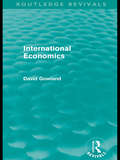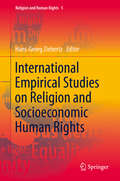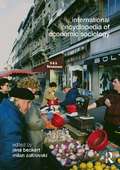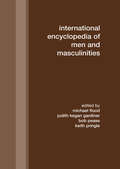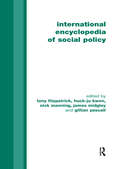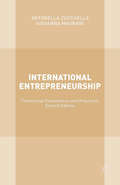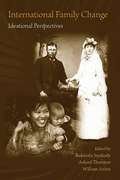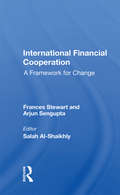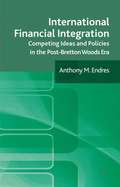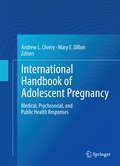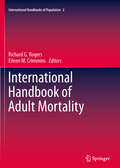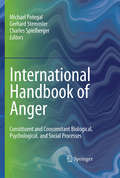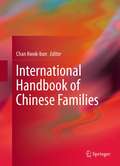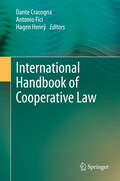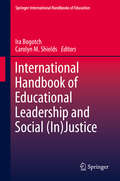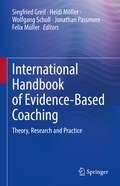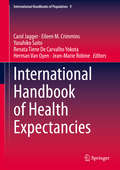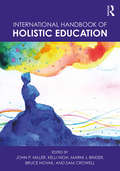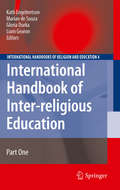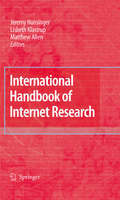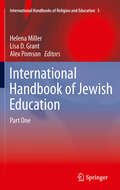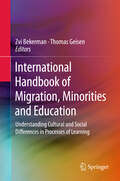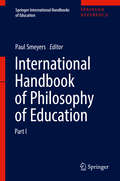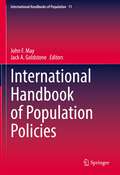- Table View
- List View
International Economics (Routledge Revivals Ser.)
by David GowlandMost of the existing textbooks on international economics - a widely taught and ighly popular subject - are long and too detailed and advanced for many students. This book, first published in 1983, and written by a respected leading authority, presents the essentials of the topic in a simple and straightforward way. The book contains the minimum of algebra and avoids detailed proofs. It incorporates the most recent theoretical advances and discusses current issues in comercial policy. Moreover, it puts less emphasis than other textbooks on trade theory and more on balance of payments theory and on questions of international finance and international finance anf international monetarism which are the areas of current concern.
International Empirical Studies on Religion and Socioeconomic Human Rights (Religion and Human Rights #5)
by Hans-Georg ZiebertzSocioeconomic rights include rights with regard to social security, labour and employment, as well as cultural rights which may be regarded as a shield for the protection of human dignity, especially of specific groups, such as women, children and refugees. The enforceability of socioeconomic rights clearly distinguishes them from other rights. These rights need, perhaps more than others, the support of civil society. Because states have leeway in how resources are distributed, civil society has a major impact on what resources are used to fulfil socio-economic rights. One of the actors in the public arena are religious traditions, respective Churches. Most of them have developed ethical standards for individual conduct and rules for living together in society based on their basic scriptures. All three monotheistic religions, Judaism, Christianity, and Islam, are marked by a caring engagement for the poor, the sick, the old and the foreign. From an empirical perspective, the general research question of this volume is how young people understand and evaluate socioeconomic rights and to which degree religious convictions and practices are connected with attitudes towards these human rights. Can religion be identified as a force supporting the human rights regime and which additional concepts strengthen or weaken the consent to these rights? The richness of empirical data contributes to a better understanding how socioeconomic rights are legitimated in the opinion of more than 10.000 respondents in 14 countries.
International Encyclopedia of Economic Sociology
by Jens Beckert Milan ZafirovskiThe International Encyclopedia of Economic Sociology is the first encyclopedia in the field and a timely response to the surge of interest in economic sociology over the last 30 years. Economic Sociology deals with the multiple and complex relations between economy and society. In particular, it focuses on the impact of social, political and cultur
International Encyclopedia of Men and Masculinities
by Michael Flood Judith Kegan Gardiner Bob Pease Keith PringleThe International Encyclopedia of Men and Masculinities offers a comprehensive guide to the current state of scholarship about men, masculinities, and gender around the world. The Encyclopedia's coverage is comprehensive across three dimensions: areas of personal and social life, academic disciplines, and cultural and historical contexts and formations. The Encyclopedia: examines every area of men's personal and social lives as shaped by gender covers masculinity politics, the men's groups and movements that have tried to change men's roles presents entries on working with particular groups of boys or men, from male patients to men in prison incorporates cross-disciplinary perspectives on and examinations of men, gender and gender relations gives comprehensive coverage of diverse cultural and historical formations of masculinity and the bodies of scholarship that have documented them. The Encyclopedia of Men and Masculinities is composed of over 350 free-standing entries written from their individual perspectives by eminent scholars in their fields. Entries are organized alphabetically for general ease of access but also listed thematically at the front of the encyclopedia, for the convenience of readers with specific areas of interest.
International Encyclopedia of Social Policy: 3-volume Set
by Tony Fitzpatrick Huck-Ju Kwon Nick Manning James Midgley Gillian PascallAvailable in paperback for the first time, this milestone work offers an in-depth treatment of all aspects of the discipline and practice of social policy globally. Supported by a distinguished international advisory board, the editors have compiled almost 900,000 words across 734 entries written by 284 leading specialists to provide authoritative coverage of concepts, policy actors, welfare institutions and services along a series of national, regional and transnational dimensions. Also included are biographical entries on major policy makers and shapers. The editors have particularly striven to provide strong coverage of differing geographical and cultural traditions so that the variety of social policy, as both an academic discipline and a domain of governance, is reflected. Contributors draw in and make the necessary connections with social policy's associated disciplines to provide a rich picture of this vast and highly diverse field. Comprehensive and authoritative, the Encyclopedia has sought to open up rather than to foreclose the numerous areas in which there is on-going research, debate and, sometimes, serious disagreement and divergence in theory and practice. To this end, entries attempt to introduce a core or common ground of understanding before moving on to a wider discussion of debates regarding different conceptual and geographical approaches. The whole is integrated by cross-referencing and each entry includes a bibliography for further reading. There is a full index. The International Encyclopedia of Social Policy provides the most substantial mapping of the international study and practice of social policy to date and will stand as a vital storehouse of knowledge for many years to come.
International Entrepreneurship: Theoretical Foundations and Practices; Second Edition (The\mcgill International Entrepreneurship Ser.)
by Antonella Zucchella Giovanna MagnaniOver the past two decades international entrepreneurship has become a key issue in international business studies. This second edition of International Entrepreneurship examines this key emerging issue from its foundations; entrepreneurship, strategic management and international business studies. The book proposes an integrated interpretive framework in which to place international entrepreneurship, examining both theoretical and practical interests. It asserts that firms faced by global competitive pressures need to develop proactive and innovative responses to cope with the uncertainties of international markets and instead capture the opportunities. This book presents a common framework to complement the growing contributions to this topical and lively subject.
International Express: New Yorkers on the 7 Train
by Stéphane Tonnelat William KornblumNicknamed the International Express, the New York City Transit Authority 7 subway line runs through a highly diverse series of ethnic and immigrant neighborhoods in Queens. People from Andean South America, Central America, China, India, Italy, Korea, Mexico, Pakistan, Poland, Romania, and Vietnam, as well as residents of a number of gentrifying blue-collar and industrial neighborhoods, fill the busy streets around the stations. The 7 train is a microcosm of a specifically urban, New York experience, in which individuals from a variety of cultures and social classes are forced to interact and get along with one another. For newcomers to the city, mastery of life in the subway space is a step toward assimilation into their new home.In International Express, the French ethnographer Stéphane Tonnelat and his collaborator William Kornblum, a native New Yorker, ride the 7 subway line to better understand the intricacies of this phenomenon. They also ask a group of students with immigrant backgrounds to keep diaries of their daily rides on the 7 train. What develops over time, they find, is a set of shared subway competences leading to a practical cosmopolitanism among riders, including immigrants and their children, that changes their personal values and attitudes toward others in small, subtle ways. This growing civility helps newcomers feel at home in an alien city and builds what the authors call a "situational community in transit." Yet riding the subway can be problematic, especially for women and teenagers. Tonnelat and Kornblum pay particular attention to gender and age relations on the 7 train. Their portrait of integrated mass transit, including a discussion of the relationship between urban density and diversity, is invaluable for social scientists and urban planners eager to enhance the cooperative experience of city living for immigrants and ease the process of cultural transition.
International Family Change: Ideational Perspectives
by Rukmalie Jayakody Arland Thornton William AxinnMany dimensions of family life have changed. Age at marriage has risen, arranged marriages and extended families have declined, intergenerational relationships have been altered, and contraceptive usage has become widespread. Until now, most explanations have focused on structural influences that emphasize changes in social and economic circumstanc
International Financial Cooperation: A Framework For Change
by Frances StewartThis book presents papers on the recycling of funds from surplus to deficit countries; stabilizing the existing International Financial System; securing an adequate level of investment return for surplus countries; the role of the special drawing rights; and mineral and energy financing.
International Financial Integration
by Anthony M. EndresDrawing on prominent contributions by economists to the debate on international monetary reform, this book provides an historical perspective on the plans, schemes and ideas on the international financial system.
International Handbook of Adolescent Pregnancy
by Andrew L. Cherry Mary E. DillonThe rates are on the decline worldwide. But adolescent pregnancies still occur, placing millions of girls each year at risk for medical complications and social isolation and their babies for severe health problems-especially when prenatal care is inadequate or nonexistent. But as the opportunity for young women and girls increases around the world, adolescent pregnancy will continue to decline. Featuring reports from countries across the developed and developing worlds, the International Handbook of Adolescent Pregnancy analyzes the scope of the problem and the diversity of social and professional responses. Its biological/ecological perspective identifies factors influencing childhood pregnancy, as well as outcomes, challenges and needs of very young mothers as they differ across nations and regions. Salient comparisons are made as cultural contexts and community support vary widely and attention is paid to issues such as child marriage, LGBT concerns and the impact of religion and politics on health care, particularly access to contraception, abortion and other services. This global coverage heightens the understanding of readers involved in care, education and prevention programs and otherwise concerned with the psychosocial development, reproductive health and general well-being of girls. Included in the Handbook: Biological influences of adolescent pregnancy. Adolescent maternal health and childbearing. Adolescent pregnancy and mental health. International perspectives on adolescent fathers. Adolescent pregnancy as a feminist issue. Adolescent pregnancy as a social problem. Plus viewpoints from more than thirty countries. As a unique source of up-to-date findings and clear-headed analysis, the International Handbook of Adolescent Pregnancy is a go-to reference for practitioners and researchers in maternal and child health, pediatrics, adolescent medicine and global health.
International Handbook of Adult Mortality
by Eileen M. Crimmins Richard G. RogersThis handbook presents a comprehensive and up-to-date overview of unprecedented substantive, theoretical, methodological, and statistical developments and insights, and an in-depth examination of trends and patterns, in adult mortality around the world. With over two dozen chapters and more than 50 authors, this volume draws from top international mortality experts to provide one of the best overviews of life expectancy extant. The book documents remarkable gains in life expectancy, which stand out as one of the most important accomplishments of the twentieth century. Individuals in more developed countries can expect to live longer now than ever before, especially the Japanese who enjoy record-setting life expectancies. The book also explores unfortunate declines in life expectancy in selected countries brought on by such factors as infectious diseases; accidents, suicides, and homicides; and political and economic conflict and turmoil. This book synthesizes the wealth of mortality information available, clearly articulates the central findings to-date, identifies the most appropriate datasets and methods currently available, illuminates the central research questions, and develops an agenda to address these research questions. The authors carefully examine central factors related to mortality, including health behaviors, socioeconomic status, social relations, biomarkers, and genetic factors. The book will prove especially relevant to researchers, students, and policy makers within social and health sciences who want to better understand international trends and patterns in adult mortality.
International Handbook of Anger
by Gerhard Stemmler Charles Spielberger Michael PotegalBook covers a broader range of topics than other books in this area. Notably, extensive coverage of the neurobiology of anger in context of psychology and sociology is unique. Book provides broad, integrative coverage while avoiding unnecessary duplication. Contributors have read each others' chapters and there is extensive cross-referencing from chapter to chapter. Book contains a guide to content and organization of chapters and topics, along with interpolated commentary at the end of each section.
International Handbook of Chinese Families
by Chan Kwok-BunFamilies are the cornerstone of Chinese society, whether in mainland China, in Taiwan, Hong Kong, Macao, Singapore, Malaysia, or in the Chinese diaspora the world over. Handbook of the Chinese Family provides an overview of economics, politics, race, ethnicity, and culture within and external to the Chinese family as a social institution. While simultaneously evaluating its own methodological tools, this book will set current knowledge in the context of what has been previously studied as well as future research directions. It will examine inter-family relationships and politics as well as childrearing, education, and family economics to provide a rounded and in-depth view.
International Handbook of Cooperative Law
by Dante Cracogna Antonio Fici Hagen HenrÿThe degree of development reached by cooperatives of different sectors throughout the world, which among others led to the UN declaring 2012 as the International Year of Cooperatives, needs to be accompanied by a similar development of corresponding legislation. To this end, a better knowledge of cooperative law from the comparative point of view, as has already been established for other types of enterprises, becomes of great importance. This book strives to fill this gap, and is divided into four parts. The first part offers an analytic and conceptual framework with which to understand, study and assess cooperative law from a transnational and comparative perspective. The second part includes several chapters dealing with attempts to harmonize cooperative laws. The third part contains an overview of more than 30 national cooperative laws, while the last part summarizes and compares these national cooperative laws, thus laying the foundation for a comparative cooperative law doctrine.
International Handbook of Educational Leadership and Social (In)Justice
by Ira Bogotch Carolyn M. ShieldsThe International Handbook on Educational Leadership and Social (In)Justice creates a first-of-its-kind international forum on conceptualizing the meanings of social justice and leadership, research approaches in studying social justice and combating social injustices, school, university and teacher leadership for social justice, advocacy and advocates for social justice, socio-cultural representations of social injustices, glocal policies, and leadership development as interventions. The Handbook is as much forward-looking as it is a retrospective review of educational research literatures on social justice from a variety of educational subfields including educational leadership, higher education academic networks, special education, health education, teacher education, professional development, policy analyses, and multicultural education. The Handbook celebrates the promises of social justice while providing the educational leadership research community with concrete, contextualized illustrations on how to address inequities and combat social, political and economic injustices through the processes of education in societies and educational institutions around the world.
International Handbook of Evidence-Based Coaching: Theory, Research and Practice
by Jonathan Passmore Heidi Möller Wolfgang Scholl Felix Müller Siegfried GreifThis handbook comprehensively covers the fundamental key concepts in coaching research and evidence-based practice and shows how coaching can be applied to multiple contexts. It provides coaching scholars, researchers and practitioners with detailed review of the key concepts, research and new insights into coaching research and practice. This key reference work includes over 70 contributions from more than 110 leading researchers and practitioners in the field across countries, and deftly combines theory with case studies and applications from psychology, sociology, business administration, organizational studies, education, and communication studies. This handbook, edited by the top scholars in the field, is meant for an academic as well as a professional readership, and is an invaluable resource for coaches, clients, coaching institutes and associations, and students of coaching.
International Handbook of Health Expectancies (International Handbooks of Population #9)
by Eileen M. Crimmins Jean-Marie Robine Carol Jagger Yasuhiko Saito Renata Tiene De Carvalho Yokota Herman Van OyenThis handbook presents global research on health expectancies, a measure of population health that examines the interaction between quantity and quality of life. With data from Europe, North America, Asia, and beyond, it explains how to define and measure health and morbidity and how to integrate these measurements with mortality. Coverage first highlights long-term trends in longevity and health. It also considers variations across and within countries, inequalities, and social gaps as well as micro and macro-level determinants. Next, the handbook deals with the methodological aspects of calculating health expectancies. It compares results from different methods and introduces tools, such as decomposition tool for decomposing gaps, an attrition tool for attributing a medical cause to reported disability, and a tool for measuring policy impact on health expectancies. It introduces methods of forecasting health expectancies. The handbook then goes on to examine the synergies and/or trade-off between longevity and health as well as considers such topics as the compression versus the expansion of morbidity/disability and the health-survival paradox. The last section considers new concepts and dimensions of health and, more broadly, well being which can be used in summary measures of population health, including psychological factors. Researchers, clinicians, demographers, and health planners will find this handbook an essential resource to this increasingly important public health and social policy tool. It will help readers gain insight into changes in health over time as well as inequalities between countries, regions, and population subgroups.
International Handbook of Holistic Education
by John P. Miller Kelli Nigh Marni J. Binder Bruce Novak Sam CrowellProviding a comprehensive overview of holistic education’s history, conceptions, practices, and research, this Handbook presents an up-to-date, global picture of the field. Organized in five sections, the Handbook lays out the field’s theoretical and historical foundations; offers examples of holistic education in practice with regard to schools, programs, and pedagogies at all levels; presents research methods used in holistic education; outlines the growing effort among holistic educators to connect holistic teaching and learning with research practice; and examines present trends and future areas of interest in program development, inquiry, and research. This volume is a must-have resource for researchers and practitioners and serves as an essential foundational text for courses in the field.
International Handbook of Inter-religious Education
by Kath Engebretson Gloria Durka Marian De Souza Liam GearonThis Handbook has the potential to redress the distortion of information about particular religions, to add to understanding about what religions have in common, and to suggest how they can work together for justice and peace. In the present day there is a vital resurgence of interest in religions, with new movements emerging from long established religious traditions. There is also, around the world, a growing sense of the need to preserve indigenous religions, even when these have accommodated to imported traditions. The Handbook gives a voice to this resurgence of interest, and addresses inter-religious education from a range of religious viewpoints and contexts. The publication is very timely especially in light of the need for religions of the world to together contemplate and actively promote human rights, social justice and peace, for religions have a specific mandate for this.
International Handbook of Internet Research
by Lisbeth Klastrup Matthew Allen Jeremy HunsingerThis handbook, the first of its kind, is a detailed introduction to the numerous academic perspectives we can apply to the study of the internet as a political, social and communicative phenomenon. Covering both practical and theoretical angles, established researchers from around the world discuss everything: the foundations of internet research appear alongside chapters on understanding and analyzing current examples of online activities and artifacts. The material covers all continents and explores in depth subjects such as networked gaming, economics and the law. The sheer scope and breadth of topics examined in this volume, which ranges from on-line communities to e-science via digital aesthetics, are evidence that in today's world, internet research is a vibrant and mature field in which practitioners have long since stopped considering the internet as either an utopian or dystopian "new" space, but instead approach it as a medium that has become an integral part of our everyday culture and a natural mode of communication.
International Handbook of Jewish Education
by Alex Pomson Lisa D. Grant Helena MillerThe International Handbook of Jewish Education, a two volume publication, brings together scholars and practitioners engaged in the field of Jewish Education and its cognate fields world-wide. Their submissions make a significant contribution to our knowledge of the field of Jewish Education as we start the second decade of the 21st century. The Handbook is divided broadly into four main sections: Vision and Practice: focusing on issues of philosophy, identity and planning -the big issues of Jewish Education.Teaching and Learning: focusing on areas of curriculum and engagementApplications, focusing on the ways that Jewish Education is transmitted in particular contexts, both formal and informal, for children and adults.Geographical, focusing on historical, demographic, social and other issues that are specific to a region or where an issue or range of issues can be compared and contrasted between two or more locations.This comprehensive collection of articles providing high quality content, constitutes a difinitive statement on the state of Jewish Education world wide, as well as through a wide variety of lenses and contexts. It is written in a style that is accessible to a global community of academics and professionals.
International Handbook of Migration, Minorities and Education
by Thomas Geisen Zvi BekermanMigrants and minorities are always at risk of being caught in essentialized cultural definitions and being denied the right to express their cultural preferences because they are perceived as threats to social cohesion. Migrants and minorities respond to these difficulties in multiple ways -- as active agents in the pedagogical, political, social, and scientific processes that position them in this or that cultural sphere. On the one hand, they reject ascribed cultural attributes while striving towards integration in a variety of social spheres, e.g. school and workplace, in order to achieve social mobility. On the other hand, they articulate demands for cultural self-determination. This discursive duality is met with suspicion by the majority culture. For societies with high levels of migration or with substantial minority cultures, questions related to the meaning of cultural heterogeneity and the social and cultural limits of learning and communication (e.g. migration education or critical multiculturalism) are very important. It is precisely here where the chances for new beginnings and new trials become of great importance for educational theorizing, which urgently needs to find answers to current questions about individual freedom, community/cultural affiliations, and social and democratic cohesion. Answers to these questions must account for both 'political' and 'learning' perspectives at the macro, mezzo, and micro contextual levels. The contributions of this edited volume enhance the knowledge in the field of migrant/minority education, with a special emphasis on the meaning of culture and social learning for educational processes.
International Handbook of Philosophy of Education (Springer International Handbooks of Education)
by Paul SmeyersThis handbook presents a comprehensive introduction to the core areas of philosophy of education combined with an up-to-date selection of the central themes. It includes 95 newly commissioned articles that focus on and advance key arguments; each essay incorporates essential background material serving to clarify the history and logic of the relevant topic, examining the status quo of the discipline with respect to the topic, and discussing the possible futures of the field. The book provides a state-of-the-art overview of philosophy of education, covering a range of topics: Voices from the present and the past deals with 36 major figures that philosophers of education rely on; Schools of thought addresses 14 stances including Eastern, Indigenous, and African philosophies of education as well as religiously inspired philosophies of education such as Jewish and Islamic; Revisiting enduring educational debates scrutinizes 25 issues heavily debated in the past and the present, for example care and justice, democracy, and the curriculum; New areas and developments addresses 17 emerging issues that have garnered considerable attention like neuroscience, videogames, and radicalization. The collection is relevant for lecturers teaching undergraduate and graduate courses in philosophy of education as well as for colleagues in teacher training. Moreover, it helps junior researchers in philosophy of education to situate the problems they are addressing within the wider field of philosophy of education and offers a valuable update for experienced scholars dealing with issues in the sub-discipline. Combined with different conceptions of the purpose of philosophy, it discusses various aspects, using diverse perspectives to do so. Contributing Editors:Section 1: Voices from the Present and the Past: Nuraan DavidsSection 2: Schools of Thought: Christiane Thompson and Joris VliegheSection 3: Revisiting Enduring Debates: Ann Chinnery, Naomi Hodgson, and Viktor JohanssonSection 4: New Areas and Developments: Kai Horsthemke, Dirk Willem Postma, and Claudia Ruitenberg
International Handbook of Population Policies (International Handbooks of Population #11)
by John F. May Jack A. GoldstoneThis Handbook offers an array of internationally recognized experts’ essays that provide a current and comprehensive examination of all dimensions of international population policies. The book examines the theoretical foundations, the historical and empirical evidence for policy formation, the policy levers and modelling, as well as the new policy challenges. The section Theoretical Foundations reviews population issues today, population theories, the population policies’ framework as well as the linkages between population, development, health, food systems, and the environment. The next section Empirical Evidence discusses international approaches to design and implement population policies on a regional level. The section Policy Levers and Modelling reviews the tools and the policy levers that are available to design, implement, monitor, and measure the impact of population policies. Finally, the section New Policy Challenges examines the recurrent and emerging issues in population policies. This section also discusses prospects for demographic sustainability as well as future considerations for population policies. As such this Handbook provides an important and structured examination of contemporary population policies, their evolution, and their prospects.
